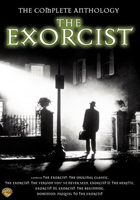 BUY IT AT AMAZON: CLICK HERE!
BUY IT AT AMAZON: CLICK HERE!
STUDIO: Warner Bros.
MSRP: $42.98
RATED: R
The Pitch
"Now you can have one crisis of faith every day of the week, and rest on the Sabbath!"
That’s right, friends and enemies, all six of the movies in the Exorcist franchise are available in one classy little boxed set. Six, did I say? Well, sorta. You get:
The Exorcist
The Exorcist – The Version You’ve Never Seen Exorcist 2 – The Heretic The Exorcist 3 Dominion – The Prequel to Exorcist Exorcist – The Beginning
So, it’s more like four films, with an alternate version of one, and an alternate history for another.
Let’s hit it like a ton of weeping statues.

The Exorcist
RUNNING TIME: 122 min.
SPECIAL FEATURES:
• Intro and commentary w/ William Friedman
• Auxiliary audio track w/ William Peter Blatty, Sound FX tests
• "The Fear of God: The Making of The Exorcist" featurette
• Interviews
• Storyboards
• Production art/sketches
• Original ending
• Theatrical Trailers
The Humans
Jason Miller, Ellen Burstyn, Linda Blair, Max von Sydow
The Nutshell
In
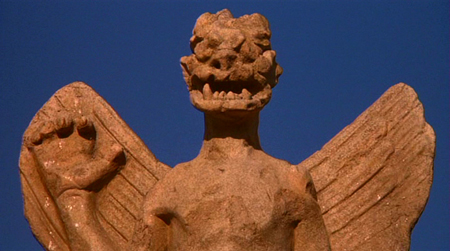
Beware of evil, for evil says, "Sup, bro."
The Lowdown
Horror isn’t just the province of brutality and blood. It has a capacity for devastating beauty. There’s a sequence in Toni Morrison’s novel Beloved in which the protagonist, a former slave, reveals her back to her lover. Her back is covered in whip scars like the limbs of trees. Her lover says it is beautiful. It’s a similar sort of feeling that good horror fiction can accomplish. Evil gets exaggerated, the experiences become more harrowing, so that in the rubble or in the scars you can find something more worthwhile than the original construct or perfect skin.
The Exorcist recognizes those best qualities of horror, while avoiding spectacle, which diminishes the human drama. The most compelling stories are those about people, rather than plot. Horror, as a genre, is seen as lesser than other genres because of its common preoccupation with spectacle. But, like Rosemary’s Baby and, to a lesser degree, the original Wicker Man, The Exorcist invests much in its characters, the goal and result being to damage by sympathy an audience who has wrapped their imaginations up in the believable actions of those characters.
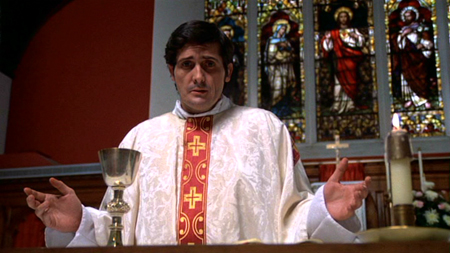
And lo! the good also say, "Sup, bro," and there will be much confusion.
I was having a conversation with my brother the other day in which we discussed how frequently the horror genre is populated by the supernatural. I can’t get explicit with too many examples, but often I think that the ghostly presences are more of a creative cop-out than a successful device; a convenient way of explaining what began as a creepy situation. (I never could enjoy What Lies Beneath.)
In The Exorcist, we get supernatural of the second-highest order, but instead of occupying a similar space as does magic for lazy fantasy writers, it is a vital and inextricable part of the story. The possession of a little girl by a demon functions perfectly, despite the ludicrous situations, because it challenges the faith of our protagonists. Faith, in turn, is a forgivable piece of abstract because it is so closely-tied to humans in general, and these characters in specific. You can deny someone’s faith as it relates to you all you want, but you can’t deny the very real impact it has on that individual.
The brilliance of the plotting is that not only does the question of faith become externalized, but poor Regan’s possession crystallizes two other parallel dramas: the disintegration of family, and the sting of personal failure. While Father Karras (Miller) fumbles toward a resolution between his intellect and the evidences of the truth of his religion, Mrs. MacNeil (Burstyn) cracks like thin ice on a pond at her impotence as a mother, and Father Merrin (von Sydow) confronts the fact that his weaknesses in the past have visited such a curse on young Regan.
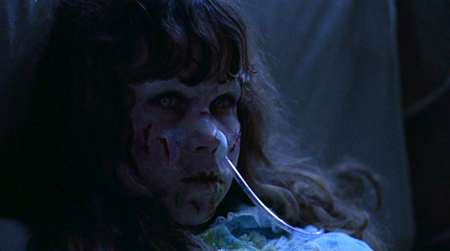
Don’t fall for the dangers of the oxygen bars. Breathairianism doesn’t work for you.
Three characters, all artfully portrayed by terrific actors, and all given drama centered effortlessly on a single, terrifying event. It’s economical writing of the best sort: effective and tight.
William Peter Blatty, who wrote the novel as well as the screenplay, succeeds further with the sensibility of classical tragedy. One of the more subtle terrors in life is the hatred of a certain quality of oneself, and the suspicion that one will be unable to change it. So, in many familiar and lovely works of literature, a protagonist hounded by such a realization will set about planning his own demise unconsciously. They realize that only through destruction will they be able to break from the habits that guide them, even if they don’t admit so to themselves. (For an explicit example of this in modern work, check out Neil Gaiman’s Sandman comics. King Lear should just about do you for a classical example.)
Father Karras’, as the central of the three tragic threads, fulfills such a role here. He is a man caught in conflict inescapable; an educated man boxed in by religious tradition, he is fully committed to two schools of thought. Maybe in his doctrine Jesus can be fully man and fully God, but he can not contain such a duality. The most devastating thread of the story follows Karras’ gradual, deliberate moves to his climactic confrontation when his reason and his faith dissolve together in a single, doomed action.
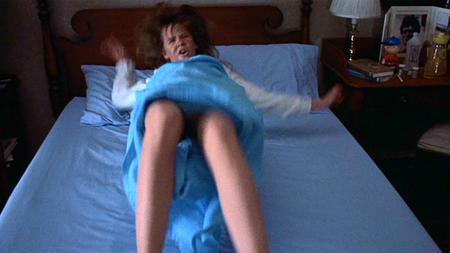
Don’t look at this image.
I obviously admire the storytelling in The Exorcist, but there are other reasons it gathers so many superlatives to itself. William Friedkin’s direction is observant, and never draws attention to itself. The special effects are handled with a grounded care, allowing them to accomplish their little twists on reality without calling too much attention to their mechanics.
I hardly need to convince many people to watch this movie. It is a classic of the horror genre, and of seventies cinema. I frequently find myself having to argue its merit against people who avoid horror, however, and the apology I use stands as a good conclusion to my thoughts on this wonderful movie: Take something beautiful you own. Break it. How do you feel? That’s what Friedkin and Blatty have done; they’ve given you that emotion without fucking up your stuff, and it’ll last longer than you will.
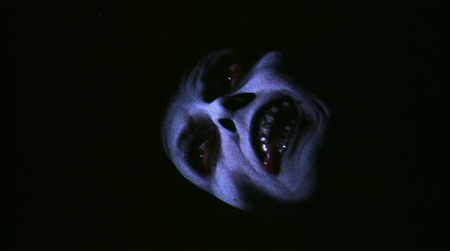
The joke isn’t very funny.
The Package
William Friedkin welcomes you to the disc with a guileless statement of his intention for the film, and then provides a similarly down-to-earth feature commentary. He’s lonely in the studio, and subsides into silence a bit too often, but it’s a genuinely interesting track, full of insight into the process and the inspiration for the film and, to a lesser degree, the novel.
William Peter Blatty also provides a bit of a commentary, but it’s broken up into bits and pieces in what they call an "auxiliary track," which also includes temp and test sound effects work for comparison purposes. Appealing, in an arcane sort of way, but not wholly necessary.
The big draw of the bonuses is the feature-length behind-the-scenes documentary, "The Fear of God: The Making of The Exorcist." It covers a lot of ground, from the novel’s creation through to post-release and beyond, and it’s plenty full of good meaty information.
You also can visit the requisite marketing bonuses: the cast/crew interviews, trailers, galleries, and concept art.
9.2 out of 10

The Exorcist: The Version You’ve Never Seen
RUNNING TIME: 132 min.
SPECIAL FEATURES:
• Feature commentary
• Promotional material
The Nutshell
Take The Exorcist, add in roughly eleven minutes of cut footage, play nice with the editor, and serve on pay cable.
The Lowdown
This isn’t a re-edit of Lord of the Rings: Extended Edition proportions. There are a few notable sequences, including a bit more violence on Regan’s part and some intermediate diagnoses of her condition. The inclusions are kind of null in their effect on the film. It’s now roughly eleven minutes longer than the theatrical cut, but no substantial changes were made to plot, theme, or development. In other words, it’s a curiosity, designed for collectors.
The Package
Another commentary track, largely the same as that in the theatrical cut, but going into more detail to explain the necessity of cutting the bits that have been restored.
I won’t bother to rate The Version You’ve Never Seen, because it’s not substantively different from the theatrical cut. Seeing this version first wouldn’t ruin your experience of the film, though.

Exorcist 2: The Heretic
RUNNING TIME: 117 min.
SPECIAL FEATURES:
• Alternate opening
• Theatrical Trailer
The Humans
Richard Burton, Linda Blair, Max von Sydow, Paul Henreid, Loise Fletcher (Nurse Ratched!)
The Nutshell
Regan MacNeil is a teenager, now, and having terrifying dreams related to the ordeal she suffered as a child. The church diocese dispatches a Father (
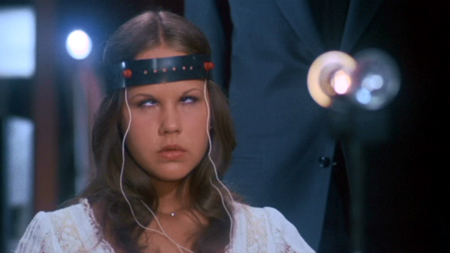
Pretend you’re one of those Magic Eye posters, dear reader.
The Lowdown
The exorcism scene in The Exorcist is brilliant, oddly kinetic, and compelling. It’s a wonderful sequence not because we finally get to see some priests kick ass for the Lord, but because it binds together the plot threads of the whole story. It’s a harrowing experience. The first thing you see in Exorcist II is an attempted exorcism, devoid of character, built up as a spectacle — exactly the thing that Friedkin managed to avoid in The Exorcist.
That sets the tone pretty well for the rest of the film. It is, in short, everything that the first one wasn’t, which means it is: a) awful, b) dull, and c) laughably banal. The conflict is an umbrella good versus evil, textureless. The tag-team of
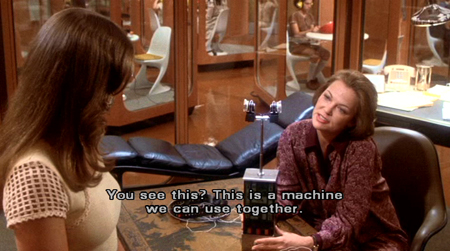
Hur, hur, hur– sorry.
After the harsh realism of the first film, this sequel’s ridiculous devices seem so disconnected from reality as to be humorous. For example, one of those devices is a literal machine, which is designed to allow two people to share a single dream hallucination. Handy for plot development, really piss poor for suspension of disbelief.
The direction is competent, but has nothing to support. I can pretend to be strong while lifting dumbbells filled with air, though, so I guess that doesn’t mean much. With a better script, it might have been a decent thriller; and with a bit more commitment to being different from its predecessor, the dream-sharing concept could have unlocked quite a bit of surreal horror. Instead, we get a limp, wretched piece of cash-in.
My favorite scene: Richard Burton attacks a fire with a crutch, instead of the fire extinguisher hanging on the wall over his shoulder. God damn you, fire! Well.. maybe he thought it was hell.
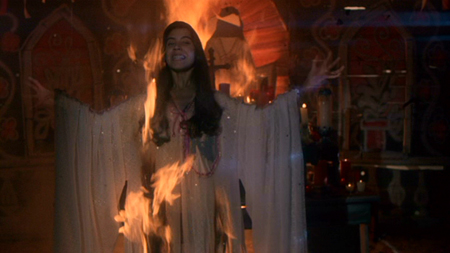
First-time missionaries often make the mistake of relying too heavily on metaphor.
"On fire for Christ," my ass…
The Package
Sometimes I thank the gods when DVD authors neglect to put on heaps of bonuses, because it means that, for a given film, I don’t have to wade through hours of shit for your amusement. For this cinematic gaseous discharge, I’m grateful that the only special features are an alternate opening sequence and the theatrical trailer.
4 out of 10

The Exorcist 3
RUNNING TIME: 110 min.
SPECIAL FEATURES:
• Theatrical Trailer
The Humans
George C. Scott, Brad Dourif, Jason Miller, Ed Flanders, Nicol Williamson
The Nutshell
Detective Kinderman (Scott), who also appeared in the first movie, has a nasty case on his hands. Someone is killing people using the same MO as The Gemini Killer, a serial murderer who was himself killed fifteen years previous — right around the same time Regan MacNeil’s demon was cast out of her, and Father Karras met his end at the foot of a long flight of stairs. But when Kinderman sees Father Karras alive and held in a sanitarium, he is forced to question what he knows about all the deaths on that awful night.
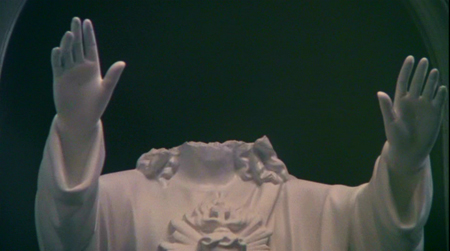
I think you can guess what Jesus would say if he had a head.
The Lowdown
William Peter Blatty took this one on for himself. The story is based on Blatty’s own novel, Legion, and does everything it can to wipe the slate clean after the abortion of Exorcist II. Even look at the title logo, in which the roman numeral "III" is diminished, so you just see the word Exorcist. Blatty’s instincts as a storyteller pay off for him in a big way; The Exorcist III isn’t even close to being the same film as the first, but it’s damn good in its individuality.
If the first movie could be confused for a drama, this one is much more of a detective flick. Kinderman rules the single-track plot, which means deductive reasoning, Holmes-like conclusions, and police procedures are the business of the day. The Holmes comparison isn’t an idle one; Kinderman wears his rational skepticism on his oft-crabby face, and his gradual submersion in the supernatural makes for a much better science versus faith plot thread than was present in Exorcist II.
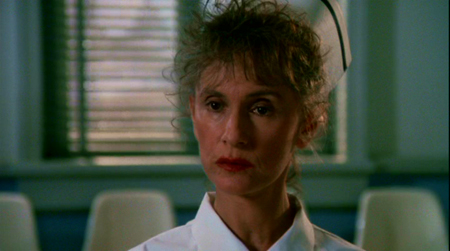
Harpo would not be pleased.
As a modern noir of sorts, it’s really much harder to classify The Exorcist III as a horror movie. Being all granular with my genres, I’d call it a thriller. It’s creepy, and the supernatural is present, but it’s not as disturbing, and not as interested with the breaking of lives. Its plot is broader, encompassing more action as well as more characters, and so it’s appeal is also broader. An audience doesn’t get as personally connected to Kinderman as they might to Father Karras, but the plot derives a respectable momentum from its tight plotting and sense of mystery.
The talent pool here matches the more overt nature of the story, with George C. Scott blustering his way practically into a heart condition, and Brad Dourif showboating his respectable intensity. Blatty is the subtlest of contributors, borrowing some of Friedkin’s directorial style and acting as patient observer of events rather than their engine
The Exorcist III dovetails nicely with the original movie, while standing apart as its own distinct creature. Rather than trying to one-up his own contributions to the original, Blatty shows his talent as a writer and spins a very different sort of a story in a familiar world with a degree of success that contradicts its "sequel number two" slot stereotype.
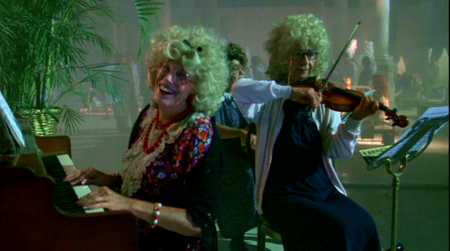
…OK. Maybe he would be.
The Package
Same deal as with Exorcist II in that there are few bonuses, only this time it would have been cool to see a few more of Blatty’s fingerprints. Unfortunately, these discs are just repackaged versions of the ones that haunt the bargain bins at your local Wal-Mart, so no such royal treatment for this underappreciated gem. You get the soundtrack (which doesn’t distinguish itself greatly from that of the first film) remastered for 5.1 surround, and the theatrical trailer.
7.6 out of 10

Exorcist: The Beginning
RUNNING TIME: 113 min.
SPECIAL FEATURES:
• Commentary w/ Renny Harlin
• Behind-the-scenes featurette
• Theatrical Trailer
The Humans
Stellan Skarsgaard, James D’arcy, IzabelloScorupco
The Nutshell
Nick’s DVD Review.
War. War never changes.
Post World War II, a young(er) Father Merrin (Skarsgaard) finds himself stripped of his faith in humanity, and facing down his faith in a loving God. While hiding from his life, he is invited to contribute to an archaeological dig of an impossibly ancient church. What he finds within could shatter what remains of his faith, as well as his life — or put them all back together.
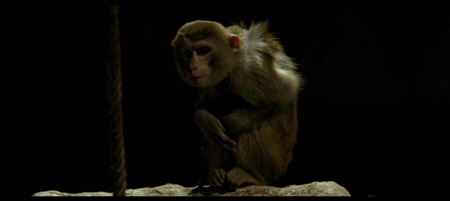
The filthy monkey, it plans.
The Lowdown
If you want to make a horror movie about demon possession, you need to set up that possession as the largest evil in the film. The original film built up the possession in a series of well-timed reveals, as Regan sank further into the clutches of the demon, exploding with a fury during the exorcism sequence. How much of an impact would the film have carried if supernatural things occurred every fifteen minutes, and thus were commonplace by the time the climax came around?
Watch Renny Harlin’s Exorcist: The Beginning and you’ll find out. It is so concerned with the spectacle of pagan and Christian mysticism that its own climactic showdown between Father Merrin and true evil is downright passé by the time it appears on screen. This robs the supernatural element of any power it has as a narrative device. It doesn’t help that Harlin’s sense of dramatic pacing is flawed, with peaks and valleys strewn about so carelessly that it’s a wonder the audience doesn’t sprain its ankle.
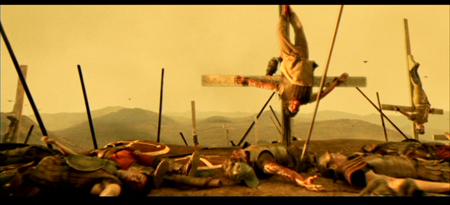
Stupid Peter bucking the system… "No, no! Crucify me upside down!
I don’t want to be like Jesus!" Stupid, trend-setting bastard.
Because of the neutering of the supernatural element, and the associated cheapening of Father Merrin’s faith struggle, The Beginning is necessarily a less dramatic story than its predecessors. Does that make it a lesser movie?
Fortunately, I don’t have to answer myself on that toughie, because there are plenty of other failings that step up to the plate and strike out. There are the unnecessary action sequences, which disrupt the story’s progress with their laughable editing and even worse CGI. There is the woefully monochromatic acting, visited upon some competent actors via a hamfisted script. There is the odd sabotage of character motivations, resulting in a lot of lost and disconnected individuals. There is even a bit of self-contradicting theology, which you might expect since it’s obvious the filmmakers didn’t take the theme of the story too seriously.
The Exorcist was a great supernatural drama; The Exorcist III was an engaging supernatural thriller; so, Harlin must have reasoned, why shouldn’t my film be a great supernatural action flick? It could have been, with a bit more attention paid to the fundamentals of storytelling. I realize Harlin was pinch hitting after Schrader was ousted from the film — hardly ideal working conditions — but he choked at the plate.
The Package
The commentary track is worth taking a listen to. Director Renny Harlin talks about his working conditions, his vision for the film, and his own sense of self-satisfaction at having completed it. Harlin comes off as disingenuous from time-to-time, and isn’t the most content-heavy of commentators, but he keeps himself away from the doldrums well enough.
There’s also a brief behind-the-scenes featurette and a trailer.
5.6 out of 10

Dominion: The Prequel to Exorcist
RUNNING TIME: 116 min.
SPECIAL FEATURES:
• Commentary w/ Paul Schrader
• Deleted scenes
• Stills gallery
The Humans
Stellan Skarsgaard, Gabriel Mann, Clara Bellar
The Nutshell
Devin’s Theatrical Review.
Nick’s DVD Review.
Post World War II, a young(er) Father Merrin (Skarsgaard) finds himself stripped of his faith in humanity, and facing down his faith in a loving God. While dealing with his past, he works on an archaeological dig of an impossibly ancient church. What he finds within could shatter what remains of his faith, as well as his life — or put them all back together.
(Ian is a copy-pasting bastard.)
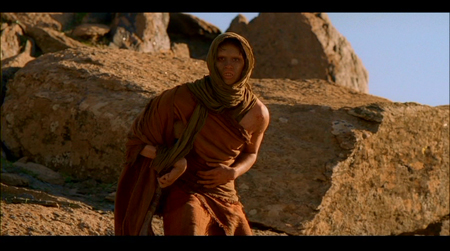
"Is Leela all right?"
The Lowdown
I didn’t emphasize it in the review for Exorcist: The Beginning, but Father Merrin’s little arc of loss of faith/regaining faith was severely underdone. He witnessed war atrocities, renounced his faith, and then swung wildly back to the "true believer" side of the spectrum with seemingly little encouragement. It is included in that movie almost as an afterthought.
In Schrader’s version of the prequel, Dominion, it is shifted to the forefront of the drama, which is where it belongs. My complaints about spectacle in this type of movie still stand: unless there’s all manner of bad-assery to be had, the characters should take the lead in the story, rather than the supernatural. Schrader’s instinct is a bit closer to that creed than was Harlin’s, resulting in a clever plot, which mirrors Merrin’s reclaiming of faith to the same events that caused him to lose it.
Unfortunately, though there are points to admire in the script, the conflict and tension are artificial and weightless. The audience enters into the film with the understanding that Father Merrin will reach the conclusion in full possession of his Christ-wielding faculties. Too much focus is placed on reaching that point, and not enough on the journey toward it. When the sea change comes, it comes without buildup or release.
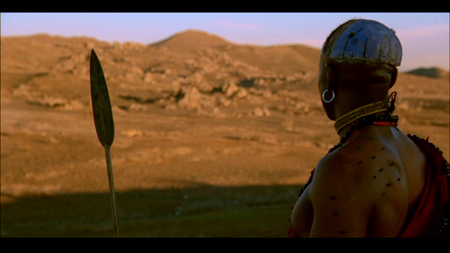
Gods, demons, white boys… They’re all fucking crazy.
Dominion is more of a character story than its contemporary, but lacking the intensity or conviction that might turn its narrative from merely palatable to something more honest and grand.
The Package
Director Paul Schrader’s commentary is fascinating, not so much for its content but for its context. Schrader is plainly happy that his version of the film gets to be seen, but there’s some bitterness in there that creeps out now and again. He’s much more story-centric in his commentary than is Harlin, and it serves the audience well.
There are also some deleted, unnecessary scenes, and a photo gallery.
6.3 out of 10